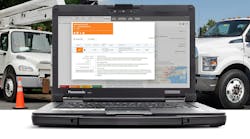COMPANY:
Nikolaus Tank Lines Bakersfield, CA
OPERATION:
Petroleum tank fleet subsidiary of FleetCard Fuels delivers gasoline and diesel to retail outlets throughout California.
Problem:
While its parent FleetCard Fuels used a computerized inventory system to create delivery orders, the resulting dispatches for the 24-truck fleet at Nikolaus Tank Lines had to be transferred to a written dispatch sheet.
“Of course there would be changes in the course of business, and we could have mistakes getting into the dispatch,” says Dave Palmer, vp & gm. “We knew we wanted to upgrade our dispatch to a computerized system and move to a paperless operation,” he says. “The inventory control system provider — Telapoint — had one that we took a look at.”
Nikolaus was interested in adding real-time tracking at the same time, and Telapoint offered that feature through an agreement with Cadec Global.
But as a hazardous materials hauler, the fleet has always stressed driver-log compliance and accuracy, and it began to realize that it could satisfy its desire to become paperless and improve safety at the same time if it could also move to an automated drivers' log system. As an inventory control system, Telapoint doesn't address drivers' logs, but it's partner Cadec does.
Solution:
By equipping its 24 tractors and trucks with Cadec Series 100 touch-screen onboard computers and adopting the company's Mobius TTS fleet management software, Nikolaus has almost completely achieved its paperless goal.
“It integrated with the inventory control system tightly, so dispatches are sent directly to the [OBC] screen on the trucks,” says Palmer. “We still have a little way to go to be completely paperless by getting into the billing side. Once we do, delivery information from the trucks — stick readings, bills of lading, arrival and departure times — will go right into our parent company's system. They'll be able to invoice and send the billing electronically, which will get rid of a lot more paper.”
On the truck side of the operation, the new onboard system has allowed the fleet to move to fully automated logs.
“The drivers just have to sign and verify them at the end of their shift,” says Palmer. “Logs are much more accurate, and our drivers liked [the automated logs] right from the start because it freed them from all that record-keeping.”
While the fleet's major objective with the new onboard system was log automation, it's also brought a number of other benefits.
“We can track off-route miles and driver behaviors, and feed better data into our preventive maintenance system,” Palmer points out. “As we speak, we're integrating [the Mobius system] with new PM software that will track all maintenance activity for our trucks and trailers, as well as control parts inventory. We might even use it to automate our payroll in the future.
“We're really excited about going paperless,” says Palmer. “We believe it will improve the accuracy of the data we used to track by paper, while saving our drivers and dispatchers a lot of time. We estimate that e-logs alone will save Nikolaus approximately $60,000 annually.”


